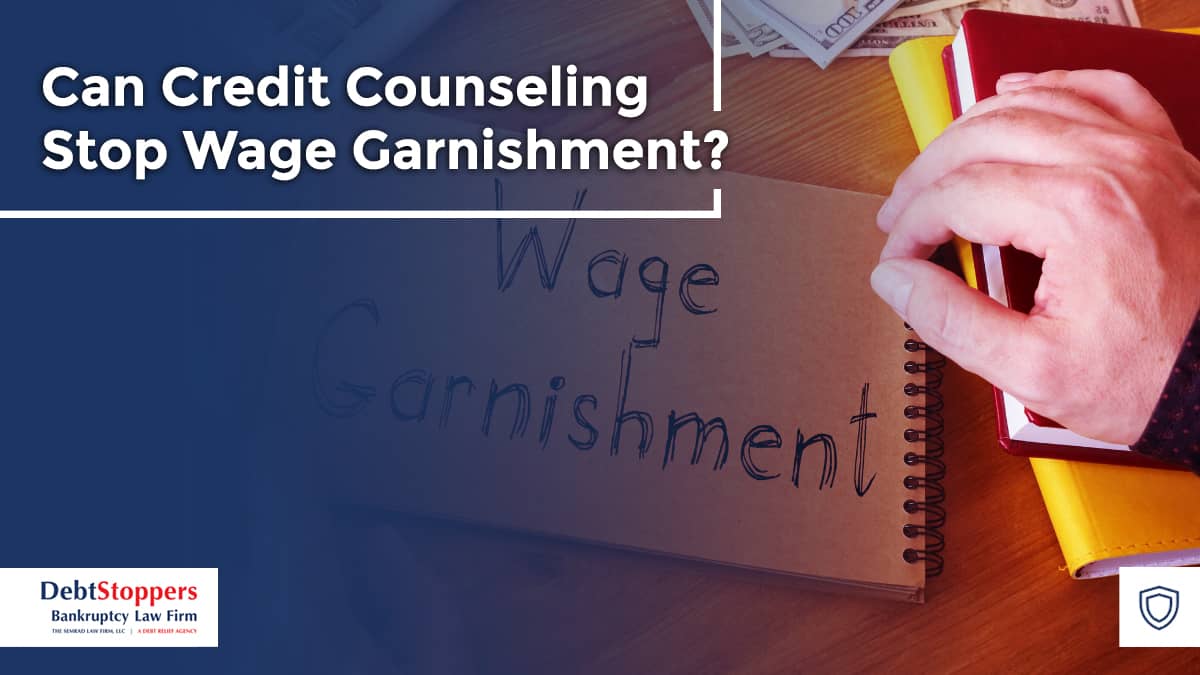Can Credit Counseling Stop Wage Garnishment?
Updated on 05 December 2025

Wage garnishment is one of those things that can hit hard, especially when money is already tight. When a chunk of your paycheck disappears before you even see it, everything in your budget gets thrown off: rent, groceries, gas, all of it. People who call us about this usually say the same thing: it feels like the situation is spiraling, and they’re not sure what they can do to make it stop. Credit counseling comes up a lot, so it’s worth clearing up what it can and can’t do.
Credit counseling can be helpful, but it doesn’t automatically stop garnishment the way bankruptcy can. What it can do is help someone get organized, talk to creditors, and sometimes prevent things from getting worse. It’s more of a supportive step than an immediate fix.
What is wage garnishment?
Wage garnishment is basically a legal tool creditors use when regular payments stop or when a judgment has been entered against someone. Instead of waiting for voluntary payments, they go through the legal system and get permission to take money directly from a paycheck. Some debts: things like child support, certain taxes, or federal student loans, don’t even require a lawsuit to trigger garnishment.
Once a court or agency issues the garnishment order, the employer has to follow it. They withhold a percentage of each paycheck and send it straight to the creditor. Federal law limits how much they can take, but even the allowed amount, often up to 25% of disposable income, can create serious strain for someone who's already juggling bills.
And something people don’t always realize is that garnishment doesn’t just stop on its own. It keeps going until the debt is paid off, or until something legally steps in to block the process. That’s why understanding options early makes a big difference, the sooner someone acts, the more control they usually get back.
What warning signs show that wage garnishment may be coming soon?
Most people don’t wake up one morning and suddenly have wage garnishment. There are usually a few warning signs, and if you spot them early, you’ve got a much better chance of stopping things before they escalate. One of the biggest red flags is when a creditor or collection agency becomes more aggressive: calling more often, sending certified mail, or warning you that your account is being “reviewed for legal action.” That usually means they’re getting ready to take the next step.
Another sign is getting a court summons or lawsuit paperwork. A lot of people panic and ignore it, but that’s actually the moment where you still have time to fight back. If you let the lawsuit go unanswered, the creditor can get a default judgment, and once that happens, a garnishment order isn’t far behind. This is why some people start asking can credit counseling stop wage garnishment before it even starts. Early action matters.
You may also notice your payday lender intensifying collection if you’ve taken out short-term loans. Credit counseling for payday loans can sometimes slow down or prevent legal action, but waiting too long reduces your options. And if you’re already comparing bankruptcy vs credit counseling, that’s usually a sign things are getting serious. The earlier you react, the more control you keep over the situation.
How does credit counseling work?
Credit counseling isn’t some complicated or fancy process, it’s really more like sitting down with someone who helps untangle everything that’s piled up. Most people who reach out are already stressed and unsure where to even start. A counselor looks over the basics: income, bills, debts, credit reports, and just talks through what’s going on. It’s not rushed. It’s not judgmental. It’s more like, “Okay, let’s see what we’re dealing with here.”
Sometimes, if it makes sense, the counselor sets up a debt management plan. That’s where they go to the creditors and say, “Look, let’s try to make this more manageable.” They often ask for interest cuts, fee waivers, or some kind of arrangement where everything is rolled into one payment instead of ten different ones. And after the plan is approved, payments go through the counseling agency, and they send the money out to each creditor. It’s a simple system, but it helps a lot of people get organized again.
It doesn’t erase debt overnight, nothing really does, but it takes the chaos out of the situation. Especially for people dealing with high-interest cards or those short-term payday loans that get out of control fast.
Credit counseling for payday loans
Now, payday loans… that’s a whole different kind of stressful. The rates are high, the deadlines are tight, and the collection pressure can be pretty intense. When someone’s behind on payday loans, they often feel like the whole thing is about to explode into a garnishment or a lawsuit.
Credit counselors can sometimes calm things down a bit. They reach out to the lenders, explain the situation, and try to set up something more realistic, lower payments, waived fees, anything that helps slow things down. Some lenders actually cooperate once they know the borrower is in a structured program.
It won’t magically undo a garnishment that already started, but it can absolutely keep things from getting worse or multiplying into more collections.

How to stop payday loan garnishment?
Stopping payday loan garnishment depends on what stage everything is in. There isn’t one answer because everyone’s situation is different. If there’s any suspicion the garnishment isn’t valid: wrong amount, wrong process, wrong creditor, it can be challenged. A lot of income types can’t legally be taken, like disability or Social Security, and sometimes the creditor doesn’t apply the exemptions correctly.
Negotiating is another option. Even if the debt was sold to another company, someone can still reach out and try to settle it or get the payments reduced. And yes, for people dealing with several debts and not just payday loans, filing for bankruptcy can be the fastest way to stop wage garnishment. Bankruptcy immediately puts a stop to collection activity, that’s what the automatic stay is for.
For some people, that’s the moment things finally stop spiraling.
Can credit counseling stop wage garnishment?
Credit counseling by itself usually can’t stop a garnishment once the court order is active. That part doesn’t change unless a legal action steps in. But if the creditor is close to filing and sees that someone is actively trying to fix things through a debt management plan, they may pause or slow down the process. It depends on the creditor and how far along things are.
So it’s not a guaranteed solution, but it’s definitely helpful as part of an early strategy to stop wage garnishment.
When can credit counseling prevent garnishment before it starts?
If wages haven’t been touched yet, there’s often more room to work. Counselors or attorneys can try debt settlement, negotiations, repayment plans, anything that convinces the creditor not to take the next step. A lot of garnishments are completely avoidable if someone acts early enough.
Bankruptcy vs. credit counseling: which is better?
People ask this a lot. They’re both tools; they just work differently.
Bankruptcy is immediate. As soon as the case is filed, everything stops: the garnishment, the calls, the letters. Chapter 7 wipes out a lot of unsecured debt. Chapter 13 puts everything into a structured plan for a few years. It’s a serious step, but it has serious protections.
Credit counseling is quieter. No court, no public record. It helps people who can realistically pay their debts back with lower interest and structure. It’s not ideal when someone already has a garnishment draining their paycheck, but it’s excellent for long-term stability.

How can a wage garnishment attorney help?
When garnishment hits or is about to hit, a wage garnishment attorney becomes extremely useful. They check whether the order is even legal, whether exemptions were ignored, whether the creditor followed the rules. You’d be surprised how many errors show up in these cases.
An attorney can negotiate settlements, reduce balances, defend against lawsuits for deficiency amounts… and if needed, they can help someone decide whether filing for bankruptcy is the right move to finally stop wage garnishment.
At DebtStoppers, we see these situations every day. The stress, the urgency, the panic, all of it. And we walk people through what their options are, step by step, until they have control over their paycheck again. No one should feel trapped by garnishment; there’s almost always a path forward.
Why choose DebtStoppers when you need a wage garnishment attorney to protect your paycheck?
When your paycheck is at risk, the last thing you need is guesswork. That’s why people often turn to DebtStoppers when they need a wage garnishment lawyer who actually knows how to step in fast. Their attorneys understand how stressful garnishment can be, and they don’t waste time. They look at your situation right away, check whether the order is legal, and explain your options in plain English, not confusing legal speak.
If a creditor skipped steps, miscalculated exemptions, or moved ahead too aggressively, DebtStoppers can challenge the process and, in some cases, even get part of your wages returned. If stopping the garnishment requires a bigger move, like bankruptcy, they’ll walk you through bankruptcy vs credit counseling so you know which path gives you the most protection. And if your issue started because of payday loans or high-interest debt, they can help you explore solutions beyond credit counseling for payday loans.
People choose DebtStoppers because they don’t just jump in at the end of the problem, they help you stop the spiral before it gets worse. Whether you’re trying to avoid garnishment or you’re in the middle of one already, their team knows how to protect your income and get your finances back under control. When your paycheck is on the line, having a legal team that understands every angle of wage garnishment makes all the difference.





